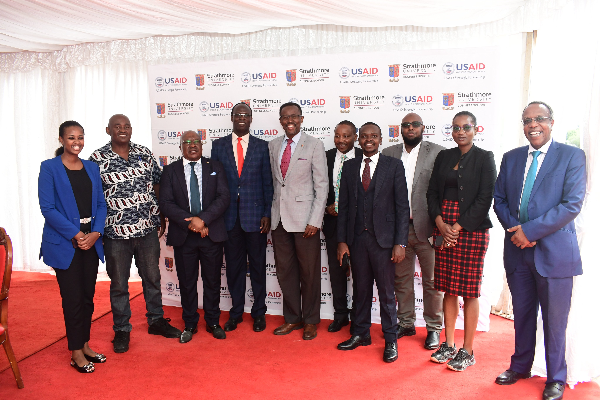
Our Projects are
Transforming African Trade
Quick Contacts
2nd Floor, Fidelity Insurance Centre Waiyaki Way, Westlands

The United States Agency for International Development-USAID’s Strategic Partnership Program (USPP) and the Fresh Produce Consortium of Kenya (FPC-Kenya) today organized an avocado consultative meeting to discuss quality standards and compliance for local and global markets further aiming to improve farmers’ production and livelihoods.
According to Dr. George Njenga, Chief of Party at USAID-USPP, avocado has emerged as one of the fruits transforming livelihoods of communities yet the effect has not been felt fully by smallholder farmers in Kenya.
“In Kenya, the most benefiting from this sub-sector are the big players who controls the market at the expense of our small-scale farmers in the rural areas who are still poorly organised making capacity building on issues around standards adherence for them challenging,” said Njenga.
This is why this program is coming in to, one, set up a system through small and medium enterprises (SMEs) to help offer advisory services to the farmers and connect them to the markets, two, to bring together the growers so that we have the capacity to produce enough for the market and to help all counties within the arid and semi-arid lands (ASALS) adopt resilient practices in the wake of climate change.”
Njenga also stressed that the 5-year program which is implemented by Strathmore University Business School (SBS) and funded by the USAID will be focusing on building resilient and sustainable businesses for social-economic transformation through three main pillars: Agency and Voice of the Private Sector (AVPS), Kenya Small Business Development Centers (Kenya SBDC), and Transformational Resilience Programming (TRP).
“We are looking at 15 farmer production cooperatives formed in a number of counties and trained on management of production and value addition to avoid food wastages,” he said adding that beneficiaries must be 40 per cent women.
The program is also aiming at putting policies in place and mapping the various regions for climate and weather advisories.
Dr. Caesar Mwangi, Dean SBS at Strathmore University said that the institution is open to support the society in creating a sustainable ecosystem through collaborations.
“We are glad to be part of this conversation and ready to develop business networks down to the counties that will enable women and the youth especially from the ASAL communities to benefit from this program,” said Mwangi.
Changing business environment
The stakeholders also highlighted the ever changing business environment in the global space with new rules and standards coming in to regulate, more so, the fresh produce trading.
“These changes have great impact on farming hence there is need for training our farmers to become competitive in the global markets,” said Amb – Prof Bitange Ndemo, Kenya’s Ambassador to Belgium & EU.
He added that going into the future, there will be no business minus sustainability, technology and globalisation giving an example of Artificial Intelligent which is already being used in some developed countries to enhance quality during and post-production processes.
According to Dr. Andrew Edewa, Director Standards at TradeMark Africa, standards such as the Sanitary and phytosanitary (SPS) are the new currencies of doing business.
“It is very difficult today to conduct business in the global markets without complying with the laid out standards hence the need to train our famers and exporters to become competitive,” said Edewa.
Upcoming avocado season
Mr. Okisegere Ojepat, the CEO at Fresh Produce Consortium of Kenya (FPC Kenya) said this year’s avocado season is expected to start in three weeks time and there is high expectations that the production volume will increase by 10-12 per cent.
“We are looking forward for a good season following good rains and capacity building exercises that have been offered to farmers during the off season that we believe has and will enable them to comply with the required standards,” he said.
Even at that, no avocado will be allowed to the export market without attaining the required 24 per cent dry matter content, stressed Ojepat.
Last year, Kenya recorded avocado export to over 152 destinations with the overall volume exported increasing from 391,507 tonnes in 2022 to 468,438 tonnes in 2023.
Exports to Netherlands was highest at 27.3 per cent followed by United Kingdom at 14.4 per cent, France at 12.9 per cent, UAE at 5.8 per cent and Germany at 5.1 per cent with new emerging markets being China, India and Kazakhstan.
Read original article
Disclaimer: The views and opinions expressed in this article are those of the authors and do not necessarily reflect the official policy or position of TradeMark Africa.